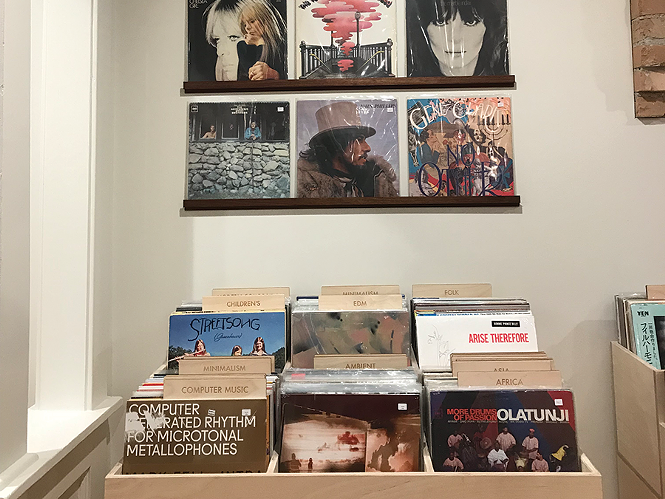
- Erin Moore
Peasantries and Pleasantries is just the name for a boutique record shop in the seemingly ever-burgeoning 9th & 9th neighborhood. Owner Parker Yates actually calls his little spot on the corner of (in fact) 8th and 8th "9th Heights," despite it actually being west of 900 East. But names are just things to pull you in, piquing your interest—and the well-curated titles Yates has stocked in his little corner of the world are no different than those you might find elsewhere.
Yet, the shop itself is different. Having just opened in June, it's part of a little core of retailers on that corner—including local vintage-clothing pushers Vantage—most of which are zoned as residential, including Yates' own shop. Being residentially zoned comes with some limitations. "The zoning requires that it isn't just an open store, and it's been a little hard to get people to grasp onto it," Yates says. "It's like, 'Oh, I can't go because I have to make an appointment,' but it's pretty simple. Just shoot me a text."
Although he's working toward getting the zoning changed to commercial, the fact that the shop is in a residential neighborhood means there are restrictions on things like noise levels. But Yates is unfazed. Even with those very specific rules—one appointment at a time, two appointments in an hour, only 16 per day—business has been working out for him.
Of course, there are also benefits to a residential shop: He's always available to meet customers who text or DM him, since he lives there, too. Behind a low shelf is a bed, covered in a bright pink blanket, gently tucked. The rest of the space is furnished impeccably with pale mid-century modern pieces. As long as he's in this home, he's available for sales, sometimes taking in customers as late as 10 p.m.
Besides visitors coming to peruse his tight collection of über-curated vinyl, tapes and even some CDs, the space also played host to a house party earlier this summer, which featured 80-year-old jazz musician Lloyd Miller. "There were like 40 people crammed inside here," Yates says excitedly. "The windows were open, people brought their own lounge and camper chairs and were sitting out on the porch."
But more than just the fun of it, the event was in line with his goals for the shop and himself. "It was this really intense experience of me putting a show on. It was something that we curated and brought to the space," he says. "It was just insanely inspiring ultimately to like, finally cultivate something that I wanted." This urge to curate and share music he loves and wants people to hear extends to other projects, like a service he operates for restaurants and DJs, "anyone who can purchase music physically." He even offers personal shopper service for some of his regulars.
His curatorial personality was honed over the years he spent hanging out in his father's local chain of record shops, Pegasus Records (now out of business), which had locations in St. George, Bountiful and Salt Lake City. After high school, he got his first job at Modified Records by the University of Utah. "Competing with Graywhale, it eventually went under," he says. "I only worked there for a year. But it was the coolest job I ever had—it didn't feel like work."
After spending eight years working at a stable pharmaceutical job, he decided to get back to vinyl—albeit after three years of building up a collection worth selling: "The majority of the stock right now has been purchased online, but I've been slowly peppering my own collection into it as I've gotten more and more comfortable with parting ways with records." Although it's hard to let some stuff go, he says, "I try to listen to new music every single day, so having the same records kind of defeats the purpose."
So with the knowledge that he's selling some of his favorite records—a bunch are tiled up on shelves on the wall, with one gap missing where his favorite Judee Sill record was before being bought—record lovers should feel comfortable contacting him and stop in. It's also small and low-key enough to feel accessible to new collectors, with familiar records and weirdo ones mixed equally into his well-organized crates. Record aficionados can also find comfort in Yates' commitment to the best quality records; he's angling to one day have 80% vintage, deadstock or used records populating the shop, and fewer reissues. He's vigilant about the apparently common problem of record labels noodling around the rights of foreign or old, little-known records by taking CD masters and laying the files down on vinyl pressings. "I try to avoid [those labels] when I can," he says. "I want the records to be the best possible version they can be. But if it has to be a reissue, I'm OK with it."
At the end of the day, Yates just cares about getting good music out for people to find and hear, regardless of format. Looking to his spread of cassettes and CDs on his pale yellow wooden table, he says, "If something was only put on CD and that's the only way I can get it, then I'll get it."